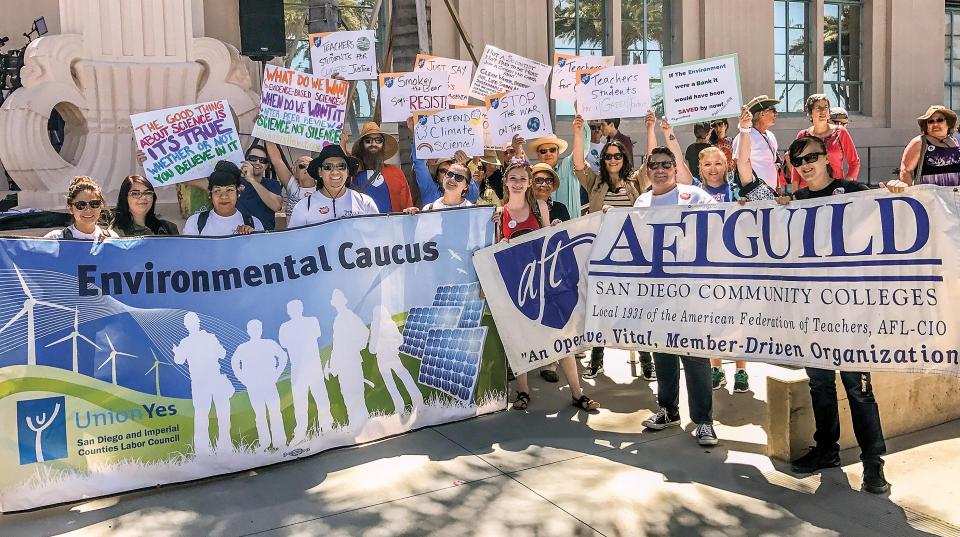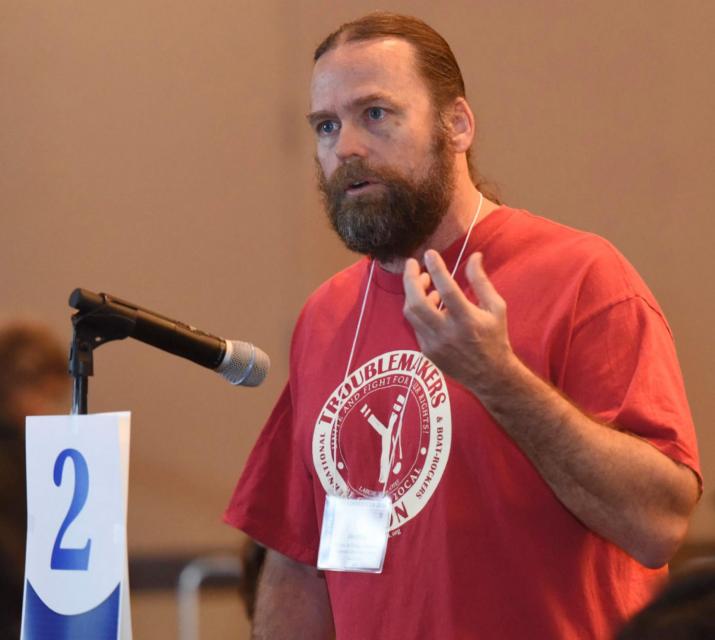By Jim Miller
The CFT made history in 2016 when it became the first statewide labor organization in the United States to adopt a Climate Justice Agenda. When Resolution 29 was brought before delegates to the CFT Convention, I presented the history of my local union in forging the San Diego and Imperial Counties Labor Council Environmental Caucus, the first such body in the nation.
Based on the mission statement of our San Diego caucus, Resolution 29 commits the CFT to educating members about climate change, pushing for green legislation, moving toward divestment in fossil fuels, and establishing a Climate Justice Task Force within CFT.
Resolution 29 was put forward by the union’s Labor in the Schools Committee, and brought to the floor immediately following guest speaker and labor historian Jeremy Brecher, who lauded our efforts and called for marrying economic and environmental justice.
“Facing a historic environmental crisis that threatens our survival,” the resolution calls upon the labor movement, as a historical force for progressive change, to “play a powerful role in calling for swift action to address the climate crisis and in producing tangible solutions that will ensure we are strengthening, not weakening, our middle class as we transition to a more sustainable economy.” The looming threat of climate change calls on CFT to be part of the larger movement pushing for such a revolution in values.
As Naomi Klein put it when speaking to one of Canada’s largest labor unions last year: “Climate change — when its full economic and moral implications are understood — is the most powerful weapon progressives have ever had in the fight for equality and social justice. But first, we have to stop running away from the climate crisis, stop leaving it to the environmentalists, and look at it. Let ourselves absorb the fact that the industrial revolution that led to our society’s prosperity is now destabilizing the natural systems on which all of life depends.”
After the Convention, the Climate Justice Task Force crafted a mission statement making it a permanent part of the CFT’s work and recommended the Executive Council commit our union to ongoing member education, incorporate a climate justice question on our candidate endorsement questionnaire, make climate a part of CFT’s legislative agenda, and promote community partnerships with environmental groups and environmental caucuses in local unions and central labor councils.
The Executive Council approved the recommendations and they were publicly unveiled at Convention 2017 in Sacramento in concert with an appearance by climate justice advocate Tom Steyer. At the Convention, the task force organized a panel discussion on how to present climate justice issues to members and students and distributed its first educational materials.
Since then, the AFT has adopted a similar resolution, promising greater climate awareness in AFT local unions and statewide organizations across the United States.
In addition, the Climate Justice Task Force has led CFT in supporting successful legislation calling for divestment from coal, and has partnered with 350.org and others to promote divestment of our pension funds from fossil fuels. As we move forward, the Climate Justice Task Force will continue as part of the Labor in the Schools Committee.
In these dark times, with the Trump administration doing everything it can to promote climate denial and roll back federal efforts to address climate change, it is our goal to be one of the lights in the darkness, calling for sanity in the face of the grave threats that face us.
Jim Miller is an instructor of English and labor studies at San Diego City College and political action vice president for the AFT Guild, San Diego and Grossmont-Cuyamaca Community Colleges, Local 1931. Miller is a member of the CFT Labor in the Schools Committee and the CFT Climate Justice Task Force.
Our Climate Justice Agenda
- Engage our members and the community about labor’s role in advocating for tangible solutions to the climate crisis that simultaneously strengthen our middle class.
- Let our members know that good green jobs don’t kill construction projects, but rather can actually increase economic opportunity.
- Work to ensure a just transition for working people by insisting that those who might be displaced are retrained for the new economy, and that the green economy must create career union opportunities.
- Build and sustain real partnerships with the local environmental movement and community groups committed to economic and environmental justice.
- Push for bold new political and policy initiatives that effectively address economic inequality and climate change.
- Ensure that candidates’ positions on climate justice are part of CFT’s evaluation for endorsement in political races.
- Insist that we work towards ending all of our retirement systems’ investments in fossil fuels and other commercial enterprises that are contributing to catastrophic climate change.
- Promote legislation that moves us toward sustainability and climate justice.
Five ways you can take action
- Share the CFT’s climate justice educational materials with your colleagues and friends. Find them in our toolkit.
- Promote education about climate change and climate justice with your students and in your community.
- Help design curriculum across disciplines to educate your students.
- Start an environmental caucus in your local union and your central labor council.
- Work politically and legislatively to support climate justice.


